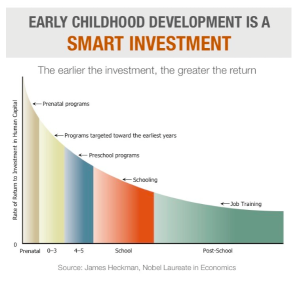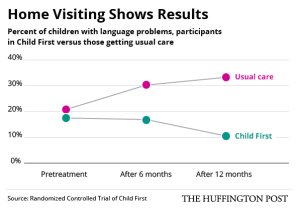Results are In: In-Home Behavioral Health Services are Successful and Effective

Imagine you’re a single mother working minimum wage, struggling with childcare and housing, raising two children, and juggling financial and emotional struggles. The only way you can describe your life is “overwhelming” and you feel like giving up is the only answer.
This, and many others, is the type of family situation that puts children at grave risk of economic, emotional and psychological issues in the future. Children are less likely to succeed in school or in the workplace and are more likely to have health problems and run into trouble with the law as adults. There may be an answer, and it’s easier than you think.
In-home services, like those provided by KVC Behavioral Healthcare Kentucky, offer a possible solution to help families. Staff members work with families in their homes rather than office settings up to 3-4 times per week, addressing issues such as poor housing or lack of medical care with a main focus on improving family relationships through therapy.
In a recent Huffington Post article by Jonathan Cohn, mental health clinician Flora Murphy with Child First, a home visiting program in Connecticut, explains why in-home care has been so successful, “People are most comfortable and most themselves at home. It’s most effective, too, for working with children. You bring children into an office setting, they’re nervous and they’re really not themselves. And it’s really not an (ideal) place to do what we need to do, which is work with families.” In-home service programs based on decades of research showing that the first few years of life are critical in brain development and that there’s a need for services that come to the family, eliminating many barriers that prevent children from getting care.
Genes are the blueprint for smarts, skills, and sensibilities but experiences determine how the body interprets the  blueprint. Physical abuse, emotional neglect and other forms of prolonged adversity for infants and babies have the most profound and long-lasting effects, and these effects are physiological. Through the presence of nurturing caregivers, children first learn to calm down, show patience and overcome new challenges. When loving adults aren’t around to provide comfort and care, a child doesn’t learn these important lessons and is more likely to act out. Addressing these problems later in life is extremely tough, not to mention expensive.
blueprint. Physical abuse, emotional neglect and other forms of prolonged adversity for infants and babies have the most profound and long-lasting effects, and these effects are physiological. Through the presence of nurturing caregivers, children first learn to calm down, show patience and overcome new challenges. When loving adults aren’t around to provide comfort and care, a child doesn’t learn these important lessons and is more likely to act out. Addressing these problems later in life is extremely tough, not to mention expensive.
In-home services have proven to be a possible solution. In 1970, a developmental psychologist by the name of David Olds started a home visiting program. He believed that targeting first-time mothers was key to teaching parenting skills they  might not have previously learned. Olds felt this was the best chance to stop the cycle of poverty in its tracks. Over two years, Olds found that child abuse amongst families in his program had plummeted compared to the child abuse that was amongst families not in his program. After many experiments, the families that received in-home therapy had fewer medical problems, higher participation in the workforce, lower reliance on public assistance, increased use of birth control and better spacing of pregnancies.
might not have previously learned. Olds felt this was the best chance to stop the cycle of poverty in its tracks. Over two years, Olds found that child abuse amongst families in his program had plummeted compared to the child abuse that was amongst families not in his program. After many experiments, the families that received in-home therapy had fewer medical problems, higher participation in the workforce, lower reliance on public assistance, increased use of birth control and better spacing of pregnancies.
If home visiting can’t end poverty or the problems that come with it, advocates say it can still make a difference for individual families and society as a whole. The founder and chief executive of Child First explains, “There’s so much poverty, and so much trauma, and so much adversity in the lives of so many families nowadays. If we give them the right kind of help, we really believe they can thrive. They can be smart, and excel, and be creative, and add to our population and to our culture. These are families that have so much potential. We need to do the right thing.”
KVC is the largest provider of in-home behavioral health services in Kentucky, and provides similar services in other states. Strengthening families, preventing children from having to enter foster care, and helping youth overcome substance abuse disorders are just a few of the goals of KVC’s in-home programs. Learn more about our services or read the full Huffington Post article, “This May be the Most Effective Anti-Poverty Program in America.”
